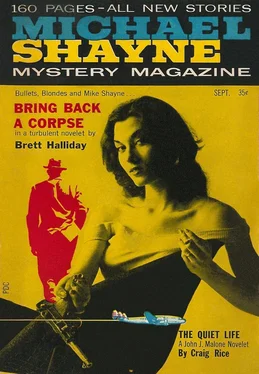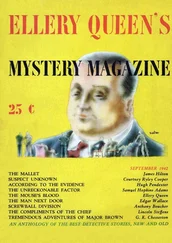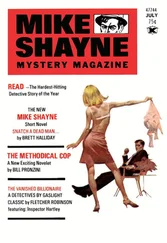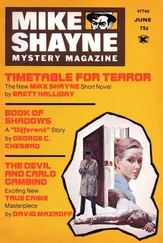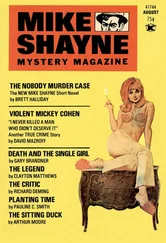Robert Bloch - Michael Shayne Mystery Magazine. Vol. 1, No. 1. September 1956
Здесь есть возможность читать онлайн «Robert Bloch - Michael Shayne Mystery Magazine. Vol. 1, No. 1. September 1956» весь текст электронной книги совершенно бесплатно (целиком полную версию без сокращений). В некоторых случаях можно слушать аудио, скачать через торрент в формате fb2 и присутствует краткое содержание. Город: New York, Год выпуска: 1956, Издательство: Renown Publications, Жанр: Детектив, на английском языке. Описание произведения, (предисловие) а так же отзывы посетителей доступны на портале библиотеки ЛибКат.
- Название:Michael Shayne Mystery Magazine. Vol. 1, No. 1. September 1956
- Автор:
- Издательство:Renown Publications
- Жанр:
- Год:1956
- Город:New York
- ISBN:нет данных
- Рейтинг книги:3 / 5. Голосов: 1
-
Избранное:Добавить в избранное
- Отзывы:
-
Ваша оценка:
- 60
- 1
- 2
- 3
- 4
- 5
Michael Shayne Mystery Magazine. Vol. 1, No. 1. September 1956: краткое содержание, описание и аннотация
Предлагаем к чтению аннотацию, описание, краткое содержание или предисловие (зависит от того, что написал сам автор книги «Michael Shayne Mystery Magazine. Vol. 1, No. 1. September 1956»). Если вы не нашли необходимую информацию о книге — напишите в комментариях, мы постараемся отыскать её.
Michael Shayne Mystery Magazine. Vol. 1, No. 1. September 1956 — читать онлайн бесплатно полную книгу (весь текст) целиком
Ниже представлен текст книги, разбитый по страницам. Система сохранения места последней прочитанной страницы, позволяет с удобством читать онлайн бесплатно книгу «Michael Shayne Mystery Magazine. Vol. 1, No. 1. September 1956», без необходимости каждый раз заново искать на чём Вы остановились. Поставьте закладку, и сможете в любой момент перейти на страницу, на которой закончили чтение.
Интервал:
Закладка:
The cop was walking him out through the doorway onto the sidewalk. At the curb was parked a bright red Jaguar. A man was climbing out of it — and the man was Mac. Mac was heavier than Gladden’s recollection of him, his complexion more florid, yet he was still dashingly handsome in his dark brown slacks and shaggy, cream-colored sports coat.
Gladden’s throat tightened for an instant so he could not call out. When the call did come, it was lost in the blast of gunfire and the roar of a black coupe that sped westward along Sunset.
MacComber drew himself up up straight. He stood quite still for a moment before his legs gave way, and he sank to his knees, gripping his belly. Then he toppled over sideways and lay on the sidewalk, the tiny pink bubbles breaking between his lips.
Almost instantly, a crowd gathered, forming a tight, dense circle around Mac and the cop, who was attempting to take charge. People pushed and shoved to get a better view, talking excitedly, telling the cop and each other how they had seen the black coupe, and the two men in it, had heard the shots fired. A prowl car swung up and stopped, and two more policemen leaped out.
Gladden moved away from the scene, walking slowly until he turned off onto a side street, then more briskly. In spite of his fatigue, he felt elation and new confidence. The fatigue would pass — and so would his parole period. He knew now that, someday, he would be back in Hollywood, that he’d be working for Disney after all.
A Pitch for Murder
by Louis Trimble
Jake Parker bad an accurate throwing arm, though not as accurate as Parmer Teel — which was probably a good thing, since Teel’s carnival throws caused his murder. But then, neither of them knew that he was making —
I didn’t like the assignment. Not just because it was strictly a cheap job, but because it could backfire. I can think of little worse for a private detective, just starting out in business, than running afoul of the local cops.
However, it wasn’t a matter of choice, so. here I was strolling between the sideshows and the “games” as the carnival called them. I had twenty bucks in my pocket. It represented my advance for the job. It represented, also, every dime I owned.
The head office in Seattle had hired me as branch representative east of the mountains. They paid the office rent and gave me a cut on any case they assigned me. But that was as far as it went — the rest was strictly up to me.
So far, the rest wasn’t much. The agency had a good enough reputation, but I was an unknown as far as the local cops were concerned. The city boys weren’t so bad, but Grimsby, the sheriff, didn’t like private detectives — including one Jake Parker — myself.
Besides my difficulty with Grimsby, I was becoming financially embarrassed. I had started on a very threadbare shoestring. It had reached a point where I was tying knots in it to keep eating when the carnival hit town. Much as I disliked the job that Jim Nichols, the owner, offered, I had to take it or quit the business. So I took it.
The locus of my assignment was a “game” booth, but I was under orders to be inconspicuous, so I eased my way up there via the sideshows. Being inconspicuous was a little difficult for me. Sixty-five inches, two hundred and ten pounds and a face marked by twelve years of pro football are not easy to hide.
Like any other yokel, I stopped to gawk at the half-man, half-woman show, then drifted away. In succession, I studied the bearded lady, the genuine Hawaiian dancer and the human skeleton. By then, I was at the end of the row. I began to work my way back up the other side where the game booths were located.
There was quite a crowd gathered before one booth. It was very, very hot under the steaming sun, and the smell of roasting peanuts and sawdust mingled with a strong attar of sweating farmers. The cracked skull that had finally put me out of football was beginning to object to all this. I made things a little easier by pushing to the front of the crowd. Here I was out of the sun, under an awning.
The reason for the crowd became quickly apparent. A long, lanky farmer was being urged by his friends to pitch baseballs at pyramids of wooden milk bottles. The pitchman was giving him a good spiel, too, but the character seemed reluctant.
The pitchman was a little man, skinny, with a big adam’s apple bobbing up and down along a half-shaved neck. He wore a straw hat and showed a lot of gold teeth. They glittered in the sun when he opened his mouth to give out with the spiel.
“Knock off one set of bottles, and win a doll,” he chanted. His cane waved at the prizes shelved on either side of the booth. “Three balls for a dime. Knock off two sets of bottles, and win a beautiful, luscious, tender, sugar-cured ham. Knock off three sets, and win one of those superb big-name radios, gents.”
The “superb” radios were little kitchen models in plastic — about ten inches long, six inches wide and six deep. There were three on display, two white and one brown.
The farmers were still urging their pal to throw when the pitchman saw me. He gave me a wink with his little, black-pea eyes. “Here’s a man who’ll try! Here’s a man who looks like he could throw a mean baseball. Step right up!” He gave me the wink again.
I didn’t quite get the deal, but since this booth was my assignment, I stepped up. Besides, I thought, a radio would be a welcome addition to my two-bit office.
The pitchman took my money and handed me three baseballs. The bottles were stacked on a wooden tub with three as a base, two on top of them and one at the peak. It looked simple. It was simple — for me. I had pitched enough baseballs and footballs in my time.
My first toss hit pyramid center, with enough spin to clean the table except for one bottle lying on its side. I got that with the second pitch. The little guy set them up again, and I knocked them down again. I hesitated between taking the ham and trying for the radio, but decided the radio would last longer. I needed three balls to clean the table the last time.
The pitchman reached up and brought down the brown radio. I said, “How about a white one, pal?”
His eyes turned funny. He stood very still for a moment, then shrugged and started to turn around. I said, “Oh hell, this is good enough,” took the radio and stepped back.
My performance seemed to have inspired the farmer. He laid down a dime and picked up three baseballs. I leaned against the counter to watch. Whatever went on here wasn’t on the surface. I had the feeling the pitchman had been expecting me, from the way he handed out the wink. But that didn’t make much sense — yet.
So I stayed, looking as casual as I could, and watched the farmer, whose pals called him Teel, show professional baseball form. He clipped off three wins faster than I had, and got a nice white radio for it.
“Martha’ll sure be pleased to have this in her kitchen,” he said. He started off and came back. “Maybe I ought to get another one, so she can give it for presents.”
His friends backed him up in that. The little pitchman didn’t look too pleased, but he shrugged and nodded. Teel wound up and let go. The ball was perfect, cleaning the table. The little guy set up the bottles again and Teel knocked them down the second time.
The pitchman waved his cane. “How about a nice ham, brother?”
Someone laughed. “Teel’s got a smokehouse full of hams.”
“I want another radio,” Teel said.
“Three in a row twice is hard to hit.”
“It ain’t hard for him,” someone said. “He fanned twenty Sunnyvale batters last Sunday.”
I got a laugh out of that. The pitchman didn’t, though. He wasn’t enjoying the prospect of facing the local baseball hotshot. His stock could go fast against a setup like this.
Читать дальшеИнтервал:
Закладка:
Похожие книги на «Michael Shayne Mystery Magazine. Vol. 1, No. 1. September 1956»
Представляем Вашему вниманию похожие книги на «Michael Shayne Mystery Magazine. Vol. 1, No. 1. September 1956» списком для выбора. Мы отобрали схожую по названию и смыслу литературу в надежде предоставить читателям больше вариантов отыскать новые, интересные, ещё непрочитанные произведения.
Обсуждение, отзывы о книге «Michael Shayne Mystery Magazine. Vol. 1, No. 1. September 1956» и просто собственные мнения читателей. Оставьте ваши комментарии, напишите, что Вы думаете о произведении, его смысле или главных героях. Укажите что конкретно понравилось, а что нет, и почему Вы так считаете.
